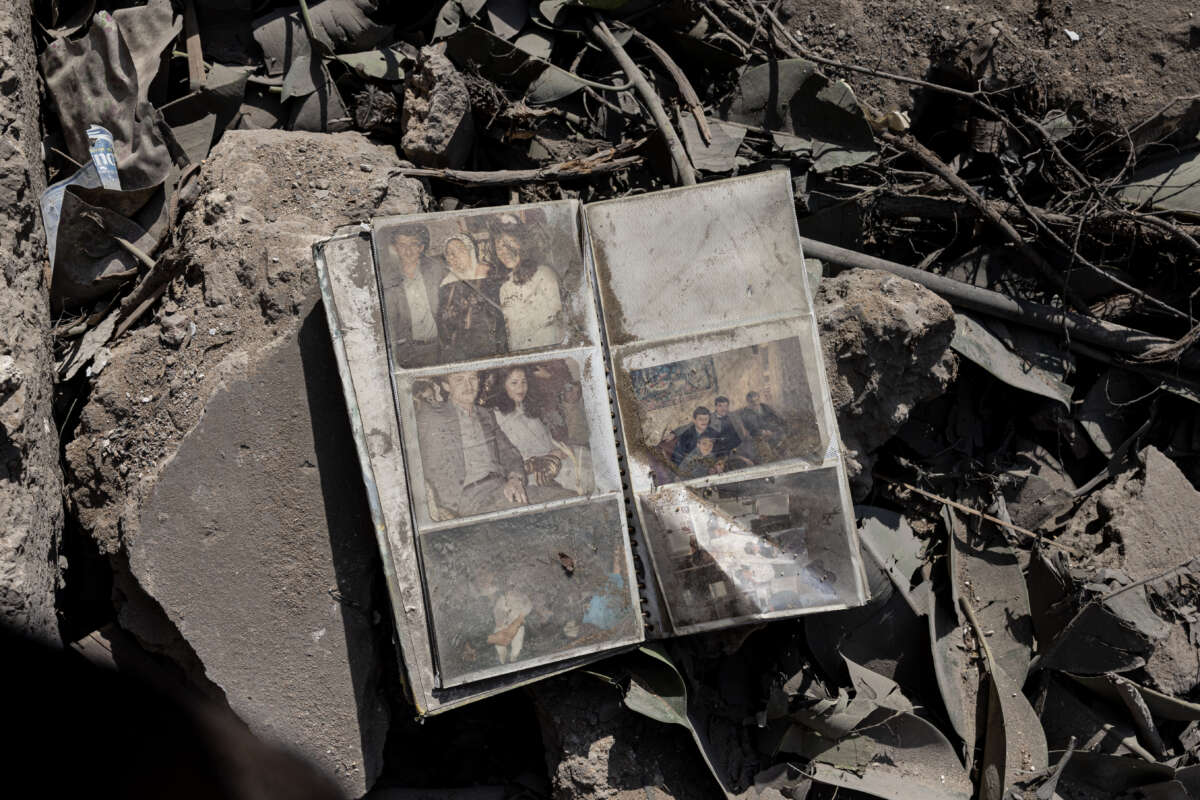At least one U.S.-supplied bomb was used by Israel in a Thursday night airstrike that killed at least 22 people and wounded over 115 more in the Lebanese capital of Beirut, according to a Guardian analysis published on Friday.
The crisis, conflict, and arms division of Human Rights Watch and a former U.S. military explosives expert analyzed shrapnel from a bomb used by Israel in the strike on an apartment complex in the densely populated Basta neighborhood near central Beirut and concluded it came from a joint direct attack munition (JDAM) manufactured by Boeing.
“The bolt pattern, its position, and the shape of the remnant are consistent with the tail fin of a U.S.-made JDAM guidance kit for MK80-series air-dropped munitions,” HRW senior researcher Richard Weir told The Guardian.
MK80-series JDAMs are attached to so-called “dumb” bombs ranging from 500 to 2,000 pounds to convert them into GPS-guided “smart” munitions.
“The use of these weapons in densely populated areas, like this one, places civilians and civilian objects in the immediate area at grave risk of immediate and lasting harm,” Weir said.
In May, the Biden administration — which has approved tens of billions of dollars in armed aid to Israel, even as the key ally is on trial for genocide at the International Court of Justice — suspended transfers of 500- and 2,000-pound bombs over fears that the devastating munitions would be used in airstrikes on Rafah, the southern Gaza city where more than a million Palestinians had sought refuge.
By that time, Israel had already dropped hundreds of 2,000-pound bombs — which the U.S. military avoids using in civilian areas because they can destroy entire city blocks — on Gaza, including in an October 31 attack on the densely populated Jabalia refugee camp that killed more than 120 civilians.
The United Nations Human Rights Office said in June that Israel’s use of 2,000-pound bombs and other U.S.-supplied weapons likely violated international law by deliberately targeting civilians in disproportionate attacks. Israeli military commanders have also been criticized for using artificial intelligence-based target selection to approve bombings they know will cause high civilian casualties.
The Biden administration resumed shipments of 500-pound bombs to Israel in July, while keeping the temporary proscription on 2,000-pound munitions in place.
While Israeli forces and Hezbollah have been engaged in cross-border attacks since the armed wing of the Lebanon — based political and paramilitary group began firing rockets and other weapons at Israel in solidarity with Gaza after the Hamas-led October 7, 2023 attack, the intensity of Israel’s assault has increased dramatically since last month.
Since then, two waves of Israeli-engineered detonations targeting thousands of pagers and other communication devices killed dozens of people including Hezbollah members and civilians, two of them children. Later in September, Israeli forces unleashed an aerial bombing campaign in Lebanon, including the September 27 strike that assassinated Hezbollah political leader Hassan Nasrallah and other senior members of the group.
Expert analysis concluded that Israel used U.S.-supplied 2,000-pound bombs in the strike on a densely populated suburb of Beirut, which flattened several residential buildings.
Lebanon’s Ministry of Public Health says that more than 2,200 people — including at least 127 children — have been killed and over 10,000 others wounded by Israeli forces since last October. Hezbollah attacks have killed 28 civilians and 39 soldiers in Israel over the same period.
On Friday, United Nations Secretary-General António Guterres joined foreign ministers from countries including China, France, Italy, Indonesia, and Turkey, as well as human rights organizations around the world, in condemning Israeli attacks on U.N. personnel in southern Lebanon after two Indonesian U.N. peacekeepers were wounded by Israeli tank fire.
We’re not backing down in the face of Trump’s threats.
As Donald Trump is inaugurated a second time, independent media organizations are faced with urgent mandates: Tell the truth more loudly than ever before. Do that work even as our standard modes of distribution (such as social media platforms) are being manipulated and curtailed by forces of fascist repression and ruthless capitalism. Do that work even as journalism and journalists face targeted attacks, including from the government itself. And do that work in community, never forgetting that we’re not shouting into a faceless void – we’re reaching out to real people amid a life-threatening political climate.
Our task is formidable, and it requires us to ground ourselves in our principles, remind ourselves of our utility, dig in and commit.
As a dizzying number of corporate news organizations – either through need or greed – rush to implement new ways to further monetize their content, and others acquiesce to Trump’s wishes, now is a time for movement media-makers to double down on community-first models.
At Truthout, we are reaffirming our commitments on this front: We won’t run ads or have a paywall because we believe that everyone should have access to information, and that access should exist without barriers and free of distractions from craven corporate interests. We recognize the implications for democracy when information-seekers click a link only to find the article trapped behind a paywall or buried on a page with dozens of invasive ads. The laws of capitalism dictate an unending increase in monetization, and much of the media simply follows those laws. Truthout and many of our peers are dedicating ourselves to following other paths – a commitment which feels vital in a moment when corporations are evermore overtly embedded in government.
Over 80 percent of Truthout‘s funding comes from small individual donations from our community of readers, and the remaining 20 percent comes from a handful of social justice-oriented foundations. Over a third of our total budget is supported by recurring monthly donors, many of whom give because they want to help us keep Truthout barrier-free for everyone.
You can help by giving today. Whether you can make a small monthly donation or a larger gift, Truthout only works with your support.

